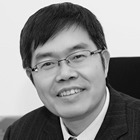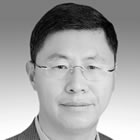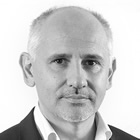|
|
|
|
|
|
 |
| KEYNOTE |
|
 |
| . |
|
|
Cinzia Casiraghi
University of Manchester, UK
Keynote – Plenary Session
Cinzia Casiraghi holds a Chair in Nanoscience at the University of Manchester (UK), department of chemistry since 2016. She received her B.Sc. and M.Sc. in Nuclear Engineering from Politecnico di Milano (Italy) and her Ph.D. in Electrical Engineering from the University of Cambridge (UK). In 2005, she was awarded with an Oppenheimer Early Career Research Fellowship, followed by the Humboldt Research Fellowship and the prestigious Kovalevskaja Award (1.5M Euro), which allowed to establish an independent research lab at the ree University Berlin. Her current research work is focused on the development of biocompatible 2D inks and their use in various applications, such as printed electronics and biomedical applications. She is also leading expert on Raman spectroscopy, used to characterize a wide range of carbon-based nanomaterials. She has co-authored about 100 publications in international journals, and counts with more than 28,000 citations to her work (Google Scholar H=47). She is recipient of the Marlow Award (2014), given by the Royal Society of Chemistry in recognition of her work on Raman spectroscopy, the Leverhulme Award in Engineering (2016), and an ERC Consolidator grant (2015).
|
|
|
|
|
 |
| KEYNOTE |
|
 |
| . |
|
|
Hui-Ming Cheng
Chinese Academy of Sciences, China
Keynote – Plenary Session
Dr. Hui-Ming Cheng is a professor and the founding director of Advanced Carbon Research Division of Shenyang National Laboratory for Materials Science, Institute of Metal Research, Chinese Academy of Sciences, and the Low-Dimensional Material and Device Laboratory of the Tsinghua-Berkeley Shenzhen Institute, Tsinghua University. He focuses on carbon nanotubes, graphene, other 2D materials, and energy storage and conversion materials. He is the founding Editor-in-Chief of Energy Storage Materials and Associate Editor of Science China Materials, and a member of Chinese Academy of Sciences.
|
|
|
|
|
 |
| KEYNOTE |
|
 |
| . |
|
|
Dmitri Efetov
ICFO, Spain
Keynote – Plenary Session
Prof. Dmitri K. Efetov (M) received a Diploma (M.Sc.) in Physics from ETH Zurich (Switzerland) in 2007, and a M.A., M. Ph. and a Ph.D. in Physics from Columbia University (USA) in 2014, under supervision of one of the pioneers of graphene Prof. Philip Kim. Prior to joining ICFO in 2017, he had worked as a postdoctoral researcher at the Massachusetts Institute of Technology (MIT, USA). Since 2017 Dmitri is a professor and group leader at ICFO, whose research program concentrates on the development of novel composite materials known as “van der Waals (vdW) hetero-structures”, which consist of graphene and other 2D materials. Dmitri received the Charles H. Towns Award for his outstanding research achievements during his PhD, and the Obra Social ”la Caixa” Junior Leader Fellowship and an ERC starting grant to start his independent research group at ICFO. Prof. Efetov is leader of the 2D-SIPC project in the Quantum Flagship (1B€ project for 10 years), as well as a member of its Science and Engineering board
|
|
|
|
|
 |
| KEYNOTE |
|
 |
| . |
|
|
Andrea Ferrari
University of Cambridge/CGC, UK
Keynote – Plenary Session
Andrea C. Ferrari earned a PhD in electrical engineering from Cambridge University, after a Laurea in nuclear engineering from Politecnico di Milano, Italy. He is Professor of Nanotechnology and the Director of the Cambridge Graphene Centre and of the EPSRC Centre for Doctoral Training in Graphene Technology. He is Fellow of Pembroke College, the American Physical Society, the Institute of Physics and the Materials Research Society. His research interests include nanomaterials growth, modelling, characterization, and devices. He was awarded the Royal Society Brian Mercer Award for Innovation, the Marie Curie Excellence Award, the Philip Leverhulme Prize, The EU-40 Materials Prize, The Royal Society Wolfson Research Merit Award. He is also the Chairman of the Executive Board of the EU Graphene Flagship.
|
|
|
|
|
 |
| KEYNOTE |
|
 |
| . |
|
|
Max Lemme
AMO GmbH, Germany
Keynote – Plenary Session
Max C. Lemme is Professor of Electronic Devices at RWTH Aachen University and the Director of AMO GmbH, Aachen. He received the Dipl.-Ing. and Dr.-Ing. degrees in electrical engineering from RWTH Aachen University, Germany. From 2008 to 2010 he was a Research Fellow at Harvard University, USA, and form 2010 to 2013 he was a Guest Professor at KTH Royal Institute of Technology, Sweden. Form 2012 to 2017 he was Heisenberg Professor at the University of Siegen and held the Chair of Graphene-based Nanotechnology. His current research interests include electronic, optoelectronic and nanoelectromechanical devices and sensors made from novel materials like graphene and related 2-D materials, Perovskites or phase change materials and their integration into the silicon technology platform. He received the German BMBF NanoFutur award in 2006, the Heisenberg Professorship of the German Research Foundation and an ERC Grant in 2012, and an ERC Proof-of-Concept Grant in 2018. He co-founded Black Semiconductor GmbH in Aachen in 2019.
|
|
|
|
|
 |
| KEYNOTE |
|
 |
| . |
|
|
Zhongfan Liu
Peking University, China
Keynote – Plenary Session
Prof. Zhongfan Liu got his PhD in University of Tokyo in 1990. He is now the BOYA Chair Professor of Peking University in chemistry, and the Director of Beijing Graphene Institute (BGI). His research interest focusses on low dimensional carbon materials, including the CVD growth of graphene and single-walled carbon nanotubes and their unique applications. Prof. Liu has published over 600 peer-reviewed articles and over 130 patents. His recent contributions to graphene areas include, superclean graphene, super graphene glass, graphene optical fiber and photochemical band structure engineering of graphene. Prof. Liu is the member of Chinese Academy of Sciences and the Fellow of TWAS
|
|
|
|
|
 |
| INVITED |
|
 |
| . |
|
|
Marcelo Lozada-Hidalgo
University of Manchester, UK
Invited – Plenary Session
Marcelo Lozada-Hidalgo is a Dame Kathleen Ollerenshaw Fellow at The University of Manchester, where he leads a research group focused on studying the permeability of two-dimensional crystals. He has published 2 Nature/Science, 3 Nature Nanotechnology and 2 Nature Communications publications as first or corresponding author since 2014. In a recent review, the editors of Nature Nanotechnology selected one of his papers as one of the most influential graphene papers in the last 15 years (Pulizzi et al. Nat. Nano 14, 914–918, 2019). He was awarded a Leverhulme Early Career Fellowship in 2016 and the ‘Andre Geim scholarship for PhD studies’ after winning a national competition in Mexico in 2012. He holds a PhD in Physics from The University of Manchester and an MSc in Physics from The National Autonomous University of Mexico (UNAM). He is co-founder of a start-up company and co-inventor of two patents – one of them licensed.
|
|
|
|
|
 |
| KEYNOTE |
|
 |
| . |
|
|
Cristiane Morais Smith
Utrecht University, The Netherlands
Keynote – Plenary Session
C. Morais Smith holds a chair in condensed matter physics at the Institute for Theoretical Physics of Utrecht University in the Netherlands. She was awarded the Winter 2019 Emmy Noether Distinction of the European Physical Society, “for her outstanding contributions to the theory of condensed matter systems and ultracold atoms to unveil novel quantum states of matter" and the 2016 Dresselhaus Prize from Hamburg University, Germany. Her research interests range from condensed-matter to cold-atom systems. In collaboration with experimental colleagues, her group has pioneered the realization of quantum fractals and higher-order topological states in electronic quantum simulators. The research done in her group spans a large variety of techniques, from tight-binding models, muffin-tin, to quantum field theory, renormalization group, Schwinger-Dyson, and Chern-Simons theory. She has given more than 250 invited talks and published more than 130 papers.
|
|
|
|
|
 |
| INVITED |
|
 |
| . |
|
|
Yuan Ping
UC Santa Cruz, USA
Invited – Plenary Session
Yuan Ping received her B.Sc. degree in Chemical Physics from University of Science and Technology of China, China, in 2007 and her Ph.D. in theoretical materials chemistry from University of California, Davis in 2013 (under Dr. Giulia Galli, currently at U.Chicago). She was a materials postdoctoral fellow at California Institute of Technology from 2013 to 2016 (under Dr. William Goddard III). In 2016, she joined the faculty at UC Santa Cruz as an assistant professor. Ping’s research interests focus on first-principles methodology development on excited-state dynamics for solids and nanostructures, in particular, from many-body perturbation theory with improved numerical efficiency and accuracy, and open quantum dynamics based on ab-initio density matrix formalism with environmental couplings. Recently she also worked on spin and exciton dynamics of point defects in two-dimensional (2D) systems as spin qubits and single-photon emitters as well as 2D interfaces.
|
|
|
|
|
 |
| KEYNOTE |
|
 |
| . |
|
|
Stephan Roche
ICREA/ICN2, Spain
Keynote – Plenary Session
Prof. Stephan Roche is a theoretician with more than 25 years’ experience in the study of transport theory in low-dimensional systems, including graphene, carbon nanotubes, semiconducting nanowires, organic materials and topological insulators.
He has published more than 200 papers in journals such as the Review of Modern Physics, Nature Physics, Nano Letters and Physical Review Letters and he is the co-author of the book titled “Introduction to Graphene-Based Nanomaterials: From Electronic Structure to Quantum Transport” (Cambridge University Press, 2020-second edition). He received the qualification to supervise PhD students from the Université Joseph Fourier (Grenoble, France) in 2004, and since then he has supervised more than ten PhD students and about 25 postdoctoral researchers in France, Germany and Spain. In 2009 Prof. Roche was awarded the Friedrich Wilhelm Bessel Research Award by the Alexander Von-Humboldt Foundation (Germany) and, since 2011, he has been actively involved in the European Graphene Flagship project as deputy leader of the Spintronics Work Package (WP). He will serve as leader of this WP from April 2020 till March 2023, as well as Division leader of the Graphene Flagship.
|
|
|
|
|
 |
| KEYNOTE |
|
 |
| . |
|
|
Mauricio Terrones
The Pennsylvania State University, USA
Keynote – Plenary Session
Mauricio Terrones, obtained his B.Sc. degree in Engineering Physics with first class honors at Universidad Iberoamericana, and was distinguished as the Best Student of Mexico in Engineering Physics in 1992. In 1994 he started his doctorate degree with Sir Prof. Harold W. Kroto (Nobel Laureate, FRS), and received his D.Phil. degree from University of Sussex in 1998. He has co-authored more than 400 publications in international journals, and counts with more than 28,000 citations to his work (His H index is 83; Google Scholar H=91). He has published in Nature, Science, Phys. Rev. Lett., Nano Lett., Nature Nanotechnology, Nature Materials, Nature Communications, Nature Chemistry, ACS Nano, PNAS, etc. In 1999, he was awarded the Alexander von Humboldt Fellowship, and carried out research at the Max-Planck Institut für Metallforschung (Stuttgart, Germany). In 2000, he was recipient of the Mexican National Prize for Chemistry. He also received the Javed Husain Prize and the Albert Einstein medal from UNESCO in 2001. In 2005, he received the TWAS Prize in Engineering Physics for his contributions in the field of carbon-based nanomaterials. This prize is given by the Academy of Sciences of the Developing world, and Mauricio is the youngest scientist ever to receive any TWAS award. In 2005, Terrones also received the “José Antonio Villaseñor y Sánchez” Prize, awarded by the governor of the state of San Luis Potosí, for his contributions to Nanoscience. He is member of the Mexican Academy of Sciences since 2002. In 2007, Terrones was elected the National Contact Point in Nanotechnology with the European Union. In 2012 was elected fellow of the American Association for the Advancement of Science (AAAS). In 2015, he was elected fellow of the Royal Society of Chemistry (UK) and was awarded the Jubilee Professorship from Chalmers University of Technology (Sweden). In 2016, Mauricio was awarded the Faculty Scholar Medal in Physical Sciences (Penn State). Mauricio is also Associate Editor of Carbon, 2D Materials, Journal of Materials Research and Nature Scientific Reports. He is Professor of Physics, Chemistry and Materials Science & Engineering with tenure at Penn State University. He is also the Founder Director of the Center for 2-Dimensional and Layered Materials at Penn State, and also the NSF-IUCRC Center for Atomically Thin Multifunctional Coatings (ATOMIC).
|
|
|
|
|
| |
|
|
|
|
|
|
|
© Phantoms Foundation 2020 |
|
|
|